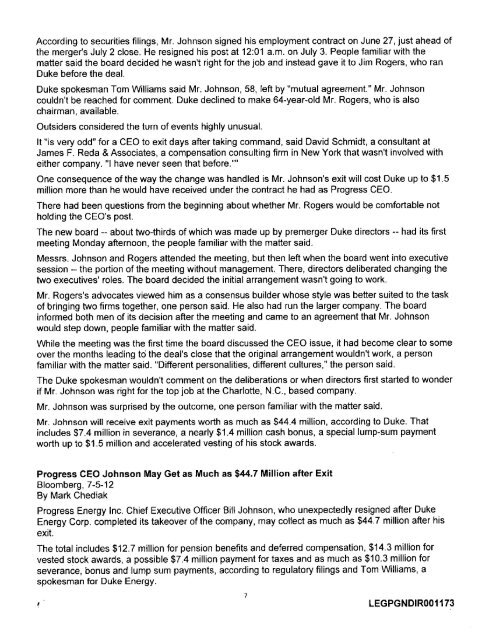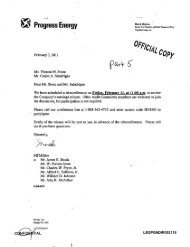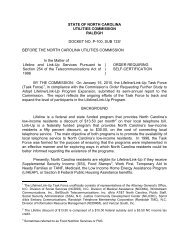- Page 1 and 2: OFFICIAL COPT ^ 7 ^ / i ( 7raises t
- Page 3 and 4: During the 2011 ''conference call;
- Page 5 and 6: discussions with Johnson that.prece
- Page 7 and 8: Executives declined to answer quest
- Page 9 and 10: People in the;World" in 2009.After
- Page 11 and 12: Energy CpipM.'26%;.ahc|:vyisconsin.
- Page 13 and 14: Those customers, for the most part,
- Page 15 and 16: Cassell is chief of coal generation
- Page 17 and 18: From: Jim Hyler | Redacted - Person
- Page 19 and 20: From: McKee, Marie | Redacted - Per
- Page 21 and 22: HostCode': 257184NOTICE Morgan[Stan
- Page 23 and 24: Cbrisequently. this lettef .is; bei
- Page 25 and 26: General Electric Co. (GE) is suspen
- Page 27 and 28: In addition, he'll receive about $1
- Page 29: Analyst Hugh Wynne at Bernstein Res
- Page 33 and 34: The report, submitted to the Japane
- Page 35 and 36: The two winning companies are to be
- Page 37 and 38: LEGRGNDIR001180, LEGPGN Dt R- REPLA
- Page 39 and 40: From: McKee, Mariel Redacted-Person
- Page 41 and 42: From: Carlos Saladrigas f Redaaed -
- Page 43 and 44: From: McKee, Mariel Redacted-Person
- Page 45 and 46: From:Sent:To:Subject:Attachments:Ne
- Page 47 and 48: Fom 4 (coni:)- Narnc.nnd Address of
- Page 49 and 50: From;Sent:To:Subject:McKee,. Marie
- Page 51 and 52: From: "Jim Hyler | Redacted - Perso
- Page 53 and 54: From:Sent:To:Rogers, Jim [Jim.Roger
- Page 55 and 56: From;Sent:To:Subject:Harrington, Su
- Page 57 and 58: From:Shiel, Tom Jr [Tom.Shiel@duke-
- Page 59 and 60: Wall Street JournalAt Work: When th
- Page 61 and 62: Despite the controversy, corporate
- Page 63 and 64: REGIONAL PRESSLos Angeles TimesCEO-
- Page 65 and 66: TRADE/BUSINESS PUBLICATIONSForbesJo
- Page 67 and 68: JOBLB FRANK, WILKINSON BRIMMER KATC
- Page 69 and 70: DUK: Media Coverage7/6/12 - 3:00PM
- Page 71 and 72: DUK: Media Coverage7/6/12 - 3:00PM
- Page 73 and 74: DUK: Media Coverage7/6/12 - 3:00PM
- Page 75 and 76: DUK: Media Coverage7/6/12 - 3:00PM
- Page 77 and 78: DUK: Media Coverage7/6/12 - 3:00PM
- Page 79 and 80: NEWSWIRESAssociated PressEx-Progres
- Page 81 and 82:
LEGPGNDIR001224
- Page 83 and 84:
South Carolina, Florida, Indiana, K
- Page 85 and 86:
Charlotte News ObserverBill Johnson
- Page 87 and 88:
Charlotte Business JournalReport: N
- Page 89 and 90:
Johnson will get $12.7 million for
- Page 91 and 92:
Triangle Business JournalJohnson mi
- Page 93 and 94:
potential insurance proceeds are un
- Page 95 and 96:
BLOGSThe Daily BeastDuke CEO Lasts
- Page 97 and 98:
The HillNews bites: Anger follows b
- Page 99 and 100:
Duke won federal approval for the m
- Page 101 and 102:
DUK: Media Coverage 07.06.12Page 2
- Page 103 and 104:
DUK: Media Coverage 07.06.12Page 4
- Page 105 and 106:
DUK: Media Coverage 07.06.12Page 6
- Page 107 and 108:
DUK: Media Coverage 07.06.12Page 8
- Page 109 and 110:
DUK: Media Coverage 07.06.12Page 10
- Page 111 and 112:
DUK: Media Coverage 07.06.12Page 12
- Page 113 and 114:
DUK: Media Coverage 07.06.12Page 14
- Page 115 and 116:
DUK: Media Coverage 07.06.12Page 16
- Page 117 and 118:
DUK: Media Coverage 07.06.12Page 18
- Page 119 and 120:
DUK: Media Coverage 07.06.12Page 20
- Page 121 and 122:
DUK: Media Coverage 07.06.12Page 22
- Page 123 and 124:
From:Sent:To:Subject:Harris DeLoach
- Page 125 and 126:
hope for best and wish you a good4t
- Page 127 and 128:
To: Harris DeLoachSubject: last eve
- Page 129 and 130:
INTENTIONALLY LEFT BLANKLEGPGNDIROO
- Page 131 and 132:
From:Sent:Harrington, :Sue C [Sue.H
- Page 133 and 134:
deceit that I have witnessed during
- Page 135 and 136:
who orchestrated it or why. The big
- Page 137 and 138:
Johnson. The commission says it rec
- Page 139 and 140:
A former board member involved in a
- Page 141 and 142:
"This can only be described as an i
- Page 143 and 144:
The North Carolina Utilities Commis
- Page 145 and 146:
the hook for billions in costs tied
- Page 147 and 148:
Before the market can ultimately de
- Page 149 and 150:
Sent: Tuesday, July 03, 2012 6:53 A
- Page 151 and 152:
From:Sent:To:Subject:Redacted - Per
- Page 153 and 154:
From:Harrington, Sue C [Sue.Harring
- Page 155 and 156:
From:Sent:To:Subject:Harris DeLoach
- Page 157 and 158:
From:Sent:To:Subject:Harris DeLoach
- Page 159 and 160:
From:Sent:To:Shiel, Torn Jr [T6m;Sh
- Page 161 and 162:
"I've certainly, been thinking that
- Page 163 and 164:
"There's riot ari ideritifiedj imme
- Page 165 and 166:
The plan, if Rogers sticks to it, i
- Page 167 and 168:
From:Sent:To:Subject:Harris DeLoach
- Page 169 and 170:
From:Harris DeLoachSent:Sunday, Jul
- Page 171 and 172:
From: William Bamet! Redacted - Per
- Page 173 and 174:
From:Sent:To:Subject:Harris DeLoach
- Page 175 and 176:
From:Harris; DeLoachSent:Sunday, Ju
- Page 177 and 178:
From:Sent:To:Subject:William Bamet
- Page 179 and 180:
From:Sent:To:Subject:Harris DeLoach
- Page 181 and 182:
From:Harris belioachSent:Monday.Jul
- Page 183 and 184:
From: Baker, John D.f Redacted-Pers
- Page 185 and 186:
From:Manly, Marc E.[Marc.Manly@duke
- Page 187 and 188:
POTENTIAL TOPICSiFOR QUESTIONS OF M
- Page 189 and 190:
Today's Top StoriesDuke Energy mav
- Page 191 and 192:
From:Harris. DeLoachSent: Monday.Ju
- Page 193 and 194:
From:Serit:To:Cc:JirriI HylerQMonda
- Page 195 and 196:
A boardroom coup at DukeEriergy
- Page 197 and 198:
Duke. Energy Corp. Chief Executive
- Page 199 and 200:
inging, a, crush of TV cameras arid
- Page 201 and 202:
Whether Progress board"? members we
- Page 203 and 204:
Johnson, 58; sighed a three-year em
- Page 205 and 206:
"The commission reserves the right
- Page 207 and 208:
Indiana, Any fuel'for the Wabash Ri
- Page 209 and 210:
"Whether it's any worse than any ot
- Page 211 and 212:
From:Sent:To:Subject:Harris DeLoach
- Page 213 and 214:
Best regards,MarieACGfNFIDEWTIAL LE
- Page 215 and 216:
From:Sent:To:Subject:Redacted - Per
- Page 217 and 218:
From:Sent:To:Subject:Harris DeLoach
- Page 219 and 220:
From:Sent:To:Subject:Harris DeLoach
- Page 221 and 222:
•• • - •-• 1 ^Most Americ
- Page 223 and 224:
From:Sent:To:Cc:Subject:Baker, John
- Page 225 and 226:
Act. tf you have receivedUhte commu
- Page 227 and 228:
Cqrisequeritl^wrilten .in hopestlia
- Page 229 and 230:
Sent: Thursday, July OS, 2012 02:12
- Page 231 and 232:
Frbm: Baker,. John D. [ Redacted -
- Page 233 and 234:
From: BaKer,.John D.Sent: Friday; J
- Page 235 and 236:
Frbm: Baker, John D. | Redacted-Per
- Page 237 and 238:
From: Baker, John D'. [Sent: Monday
- Page 239 and 240:
From: Harris DeLoachSent: Thursday,
- Page 241 and 242:
From: Harris DeLoach I Redacted - P
- Page 243 and 244:
This e-mail message and;ail documen
- Page 245 and 246:
WilflKn O-JohnwoatviQiM Eawjtivb Di
- Page 247 and 248:
Mitchell-Henderson, Trudie:From:Sen
- Page 249 and 250:
Cuuroc) ari Goipuuto ScccttrVJanuar
- Page 251 and 252:
,Jetm&McAnhiirriaeutfwWe Piwster'C
- Page 253 and 254:
JthnftMcArtfcnr ,Ewnitiva VicePrasi
- Page 255 and 256:
AttendancePROGRESS ENERGY BOARD MEE
- Page 257 and 258:
.VVg^'w i AT. AX&M^A 1 -'^'^iE^es&m
- Page 259 and 260:
PROGRESS ENERG Y BOARD MEETINGMAY i
- Page 261 and 262:
In the newtod, receipts maybe uploa
- Page 263 and 264:
IYou can view other frequently aske
- Page 265 and 266:
Although Progress Energy will riot
- Page 267 and 268:
half from theoriginai 2,900 square
- Page 269 and 270:
Baker, John D.From:Sent:To:Cc:Subje
- Page 271 and 272:
esources (O&M and capital); respond
- Page 273 and 274:
The N.C. Department ofEnvironment a
- Page 275 and 276:
Siefert said..Opening the new, busi
- Page 277 and 278:
In ah editorial published today, th
- Page 279 and 280:
'1i.;':r; ; . :Johp fl.McAithiir ;'
- Page 281 and 282:
, PROGRESS EiNER GYBOARD MEETINGJUL
- Page 283 and 284:
Baker, JohnD.From:VVeriger, Holly,S
- Page 285 and 286:
John tt McArthurH- v -.;~ , August
- Page 287 and 288:
PROGRESS ENERGY SPECIAL S^REHOLDER
- Page 289 and 290:
SCHEDULE OF EVENTSSeptember 2011Boa
- Page 291 and 292:
JohnR.McArtfcirr¥T,\ . •: Novemb
- Page 293 and 294:
PROGRESS ENERGY BOARD mETINGDECEMBE
- Page 295 and 296:
epssWIHomO. Johmon 5'detinBttPtuiit
- Page 297 and 298:
Redacted - Personal Info.From: Weng
- Page 299 and 300:
Jnfcii A. UcAi^nr ^ .,•Cotuisd ar
- Page 301 and 302:
Mitchell-Henderson, TrudieFrom:Weng
- Page 303 and 304:
WflliMD.JohitSOOChaiman.PirotJert-'
- Page 305 and 306:
JotmB. McArthur-' - ;, ;V" '-,r«ct
- Page 307 and 308:
PROGRESS ENERGY BOARD MEETINGMARCH
- Page 309 and 310:
Mitchell-Henderson, TrudieFrbm:Sent
- Page 311 and 312:
Prior to using the.Password Reset T
- Page 313 and 314:
plant:Developed jointly by Westingh
- Page 315 and 316:
Europe," the Wall Street Journal re
- Page 317 and 318:
will unilaterally or immediately.so
- Page 319 and 320:
JchaH-McAHhii!£icccut;vc,Vici! Prc
- Page 321 and 322:
Mitchell-Henderson, TrudieFrom:Sent
- Page 323 and 324:
User Application::: folders Page 1
- Page 325 and 326:
Board of DirectorsJunel0,2012FERG h
- Page 327 and 328:
Draft Press Release—to be release
- Page 329 and 330:
N.G. regulators pressed'to riile'on
- Page 331 and 332:
Ruling clears road to Duke Energy-P
- Page 333 and 334:
It wiil take about thrce years to b
- Page 335 and 336:
The merger included promises to con
- Page 337 and 338:
for closing the deal to July $; : w
- Page 339 and 340:
Page 1 of 2Entrust r , B %YZli lEnt
- Page 341 and 342:
^ Progress EnergyWilliam D. Johnson
- Page 343 and 344:
Analyst Response Summary(re: FERC's
- Page 345 and 346:
ISI "With FERC Approval The DUK Dea
- Page 347 and 348:
State schedulesDukes Scott of the S
- Page 349 and 350:
The FERC issued a similar type of d
- Page 351 and 352:
For the merger to close out on sche
- Page 353 and 354:
INTENTIONALLY LEFT BLANKLEGPGNDIR00
- Page 355 and 356:
INTENTIONALLY LEFT BLANKLEGPGNDIR00
- Page 357 and 358:
INTENTIONALLY LEFT BLANKLEGPGNDIROO
- Page 359 and 360:
INTENTIONALLY LEFT BLANKHigh LEGPGN
- Page 361 and 362:
INTENTIONALLY LEFT BLANKntial LEGPG
- Page 363 and 364:
INTENTIONALLY LEFT BLANKLEGPGNDIROO
- Page 365 and 366:
Progress EnergyWilliam D. JohnaonCh
- Page 367 and 368:
Scope of bearing narrowThe Progrcss
- Page 369 and 370:
William D. JohnsonCharman, Preiiden
- Page 371 and 372:
Page 1 of 2Standard Folders©Inbox.
- Page 373 and 374:
User Applicatipn •:: FoldersPage
- Page 375 and 376:
User Application:: Folders Page 1 o
- Page 377 and 378:
To help celebrate its 100th birthda
- Page 379 and 380:
egulations; and other factors discu
- Page 381 and 382:
"The economics of cheap gas and red
- Page 383 and 384:
Duke Energy has received requests f
- Page 385 and 386:
derecho, such a storm must cover th
- Page 387 and 388:
"We still have some ofthe employees
- Page 389 and 390:
udget defeat with the help of a han
- Page 391 and 392:
lease.• Requirement that energy c
- Page 393 and 394:
Moeller cast the lone dissenting vo
- Page 395 and 396:
This newsletter was brought to you
- Page 397 and 398:
Utilities'merger of benefit to ATCb
- Page 399 and 400:
- - - €"My goal is to work hard t
- Page 401 and 402:
a"-.The filing does not say what ca
- Page 403 and 404:
%r;-J1'\merger considerably and mig
- Page 405:
"He has been more fonvard-thinking





